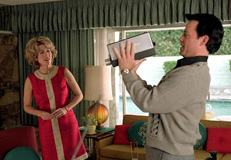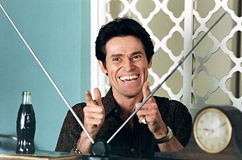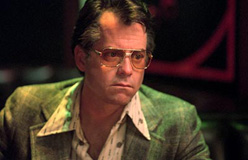Auto Focus (Paul Schrader) 2002
 Thereís at least one scene in Paul Schraderís Auto
Focus thatís sure to have die hard auteurists in a state of rapture. In it
Bob Crane (Greg Kinnear), church-going amateur pornographer and television star,
has a conference in a diner with his priest about his new tendency to swing by
the strip bar at night after a long day of filming ďHoganís HeroesĒ.
Midway through the conversation, which illustrates Craneís chipper inability
to recognize how far from ďnormalĒ heís drifted, a female fan passing by
asks for a souvenir snapshot to commemorate meeting the star, and Crane asks the
priest to take the photo. Suddenly, and quite ignorantly, Crane is implicating
his religion in his sin. Though Auto Focus is less a journey toward
salvation than most of Schraderís other films, itís impossible not to notice
the possibility of it at this moment. This meeting with the clergyman is perhaps
the only moment in the film where Kinnearís Crane seems to have much of a
soul, and even then itís fleeting. His depth doesnít even last for the
entire scene. For the rest of the film, Crane seems to be patching holes in the
sinking ship that is his life. Most of his decisions are wishy washy at best,
and contradictory at worst. Heís far less concerned with the long-term effects
of his actions than the short-term pleasures of them, and with that inherent
shortsightedness he seems perfect fodder for a cautionary tale about the shifts
in morality, both inside and outside Hollywood, during the Sixties and
Seventies.
Thereís at least one scene in Paul Schraderís Auto
Focus thatís sure to have die hard auteurists in a state of rapture. In it
Bob Crane (Greg Kinnear), church-going amateur pornographer and television star,
has a conference in a diner with his priest about his new tendency to swing by
the strip bar at night after a long day of filming ďHoganís HeroesĒ.
Midway through the conversation, which illustrates Craneís chipper inability
to recognize how far from ďnormalĒ heís drifted, a female fan passing by
asks for a souvenir snapshot to commemorate meeting the star, and Crane asks the
priest to take the photo. Suddenly, and quite ignorantly, Crane is implicating
his religion in his sin. Though Auto Focus is less a journey toward
salvation than most of Schraderís other films, itís impossible not to notice
the possibility of it at this moment. This meeting with the clergyman is perhaps
the only moment in the film where Kinnearís Crane seems to have much of a
soul, and even then itís fleeting. His depth doesnít even last for the
entire scene. For the rest of the film, Crane seems to be patching holes in the
sinking ship that is his life. Most of his decisions are wishy washy at best,
and contradictory at worst. Heís far less concerned with the long-term effects
of his actions than the short-term pleasures of them, and with that inherent
shortsightedness he seems perfect fodder for a cautionary tale about the shifts
in morality, both inside and outside Hollywood, during the Sixties and
Seventies.
 Thatís not to imply Auto Focus is a perfect
example of its genre. For starters, the decision to portray the sex in the film
as a fun diversion instead of an indicator of a twisted obsession rips most of
the danger out of the scenario. If hard-core pornography isnít whatís called
for here, at least one glimpse of full-frontal male nudity would have helped
sell the reality of the sex scenes, since as the theyíre presented, you
canít help but feel that theyíre mostly preoccupied with hiding the
actorsí genitalia. Before long, the compositions end up feeling like something
out of Austin Powers movie, and thatís hardly the desired effect, since
the footage is supposed to have been randomly captured by amateurs. The only
moment in Auto Focus where the sex feels truly taboo is during an episode
that makes Crane reassert his sexuality. Furthermore, Schraderís directorial
approach, in which he gradually bleaches out the film stock, replaces pop songs
with Angelo Badalamentiís score, and increases the shakiness of the camera is
meant to parallel the emotional and moral decline of Crane, but it often
overpowers and leaps ahead of it. Kinnear is better here than heís ever been
thanks to his ample, dopey charm, even if heís more likable in the voiceovers
than he is during the filmís action, and you wish you could judge his
performance on its own terms instead of on the styleís. Willem Dafoe plays
John Carpenter, the videophile who introduces Crane to the gadgets that become
his true obsession, and his performance is a match for Kinnearís. The scenes
they share are wonderfully written and make for most of the movieís
highlights.
Thatís not to imply Auto Focus is a perfect
example of its genre. For starters, the decision to portray the sex in the film
as a fun diversion instead of an indicator of a twisted obsession rips most of
the danger out of the scenario. If hard-core pornography isnít whatís called
for here, at least one glimpse of full-frontal male nudity would have helped
sell the reality of the sex scenes, since as the theyíre presented, you
canít help but feel that theyíre mostly preoccupied with hiding the
actorsí genitalia. Before long, the compositions end up feeling like something
out of Austin Powers movie, and thatís hardly the desired effect, since
the footage is supposed to have been randomly captured by amateurs. The only
moment in Auto Focus where the sex feels truly taboo is during an episode
that makes Crane reassert his sexuality. Furthermore, Schraderís directorial
approach, in which he gradually bleaches out the film stock, replaces pop songs
with Angelo Badalamentiís score, and increases the shakiness of the camera is
meant to parallel the emotional and moral decline of Crane, but it often
overpowers and leaps ahead of it. Kinnear is better here than heís ever been
thanks to his ample, dopey charm, even if heís more likable in the voiceovers
than he is during the filmís action, and you wish you could judge his
performance on its own terms instead of on the styleís. Willem Dafoe plays
John Carpenter, the videophile who introduces Crane to the gadgets that become
his true obsession, and his performance is a match for Kinnearís. The scenes
they share are wonderfully written and make for most of the movieís
highlights.
 If Auto Focus never completely loses view of its
subject, it also never really gets a sharp look at him either. As the movie
moves into its second hour, and stresses the pathetic existence of the B-list
celebrity, it grows glum and loses much of the sly wit that made it so enjoyable
in the first half. As Schrader starts to tell us that Crane will never ďget
itĒ, we begin to question the point of the movie. Surely it isnít revelatory
to point out that with power comes the temptation to abuse that power.
Schraderís frequent hints that weíre meant to look at Bob Crane as a product
of his society (he trots out hippies and introduces color videotapes as Crane
slides deeper into debauchery) remind us both of the televisionís invasion
into the American home and the further invasions of privacy that video age will
bring, but he doesnít seem to have a real opinion about them. This version of
Crane seems a rather inconsequential figure on which to hang bold statements
about America. If Auto Focus fails to be the truly great statement that
it obviously yearns to be, it canít be faulted much for trying, since most of
its failures on that account arise from its desire to remain honest about its
subject's limitations. As a movie-of-the-week style romp through a celebrityís
garbage can, though, itís not half bad.
If Auto Focus never completely loses view of its
subject, it also never really gets a sharp look at him either. As the movie
moves into its second hour, and stresses the pathetic existence of the B-list
celebrity, it grows glum and loses much of the sly wit that made it so enjoyable
in the first half. As Schrader starts to tell us that Crane will never ďget
itĒ, we begin to question the point of the movie. Surely it isnít revelatory
to point out that with power comes the temptation to abuse that power.
Schraderís frequent hints that weíre meant to look at Bob Crane as a product
of his society (he trots out hippies and introduces color videotapes as Crane
slides deeper into debauchery) remind us both of the televisionís invasion
into the American home and the further invasions of privacy that video age will
bring, but he doesnít seem to have a real opinion about them. This version of
Crane seems a rather inconsequential figure on which to hang bold statements
about America. If Auto Focus fails to be the truly great statement that
it obviously yearns to be, it canít be faulted much for trying, since most of
its failures on that account arise from its desire to remain honest about its
subject's limitations. As a movie-of-the-week style romp through a celebrityís
garbage can, though, itís not half bad.
* * *
10-06-02
Jeremy Heilman